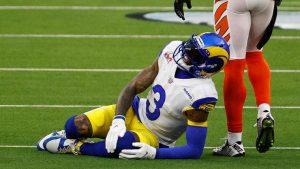During the Super Bowl 56, the game was significantly changed after wide receiver Odell Beckham Jr. suffered a knee injury during the fourth quarter. It ended his season prematurely.
After he was able to walk off the field, he immediately went to the injury tent. He was then seen walking around the sideline. The team initially said that he was questionable to return, but during halftime, head coach Sean McVay stated that his return didn’t look good.
Without his presence, the Giants were able to score their first touchdown during the second half of the game. The quarterback Matthew Stafford of the Los Angeles team was able to connect with Cooper Kupp for the score. Before the injury occurred, the former Browns player caught 27 passes for 305 yards and five touchdowns in eight games with the LA team.
Following the injury, the team announced that he would not be returning for the remainder of the game. Aside from missing the entire Super Bowl, it’s also believed that he suffered a torn anterior cruciate ligament (ACL) in his knee. This injury is the same one he suffered during the 2016 season when he was with the Cleveland Browns.
Cleveland Browns head coach Kevin Stefanski said that Beckham is “trending in the right direction” as he continues his recovery from the knee injury. In October, the New York Giants announced that Beckham had undergone surgery and would be ready for the 2021 season. Before the injury, he had a disappointing season, with his catches dropping to their lowest since his rookie year.
The injury occurred after he had already set lows in his previous season. In 2019, he only had 4.6 catches and 64.7 yards per game. This was his lowest season since his rookie year. The Browns are hoping that their veteran player can bounce back from a disappointing season. During the NFL’s “Flip The Turf” campaign, players are urging teams to play on natural grass fields instead of artificial ones.
According to the players’ petition, playing on turf fields leads to a higher number of non-contact injuries. Also, the hot conditions of the playing surface can increase the release of toxic gases.
Currently, it is illegal for turf fields to be recycled in the US, which means that over 340 million pounds of landfill waste are generated annually.

Turf fields are also known to contribute to global warming. They do not filter air pollutants and are not ideal for reducing greenhouse gas emissions. They contribute to the development of fossil fuels and contribute to air pollution.